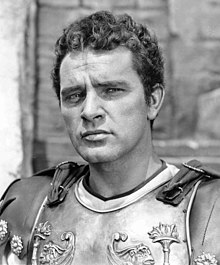Richard Burton | |
|---|---|
 Burton in The Robe (1953) | |
| Born | Richard Walter Jenkins Jr. 10 November 1925 Pontrhydyfen, Wales |
| Died | 5 August 1984 (aged 58) Céligny, Switzerland |
| Burial place | Old Cemetery ("Vieux Cimetière") of Céligny |
| Education | Exeter College, Oxford |
| Occupation | Actor |
| Years active | 1943–1984 |
| Spouses |
(m. 1975; div. 1976) |
| Children | 3, including Kate Burton |
| Awards | Full list |
Richard Burton CBE (/ˈbɜːrtən/; born Richard Walter Jenkins Jr.; 10 November 1925 – 5 August 1984) was a Welsh actor.[1]
Noted for his mellifluous baritone voice,[2][3] Burton established himself as a formidable Shakespearean actor in the 1950s and gave a memorable performance as Hamlet in 1964.[4] He was called "the natural successor to Olivier" by critic Kenneth Tynan. Burton's perceived failure to live up to those expectations[5] disappointed some critics and colleagues; his heavy drinking added to his image as a great performer who had wasted his talent.[3][6] Nevertheless, he is widely regarded as one of the finest actors of his generation.[7]
Burton was nominated for an Academy Award seven times but never won. He was nominated for his performances in My Cousin Rachel (1952), The Robe (1953), Becket (1964), The Spy Who Came In from the Cold (1965), Who's Afraid of Virginia Woolf? (1966), Anne of the Thousand Days (1969) and Equus (1977). He received numerous accolades, including a BAFTA Award, a Golden Globe Award and a Grammy Award. He received the Tony Award for Best Actor in a Musical for his portrayal of King Arthur in the Lerner and Loewe musical Camelot (1960).
In the mid-1960s, Burton became a top box-office star.[8] By the late 1960s, he was one of the highest-paid actors in the world, receiving fees of $1 million or more plus a share of the gross receipts.[9] Burton remained closely associated in the public mind with his second wife, Elizabeth Taylor. The couple's turbulent relationship, married twice and divorced twice, was rarely out of the news.[10]
- ^ Obituary Variety, 8 August 1984
- ^ Clarke, Gerald (20 August 1984). "Show Business: The Mellifluous Prince of Disorder". Time Magazine. 124 (8). Retrieved 30 September 2013.
- ^ a b Cite error: The named reference
NYTDowdwas invoked but never defined (see the help page). - ^ "The death of Richard Burton". BBC. Retrieved 2 December 2023.
In the 1950s and early 60s Burton was the darling of the theatre circuit and his 1964 interpretation of Hamlet was outstanding. He was, many felt, the natural successor to Olivier.
- ^ Kalfatovic, Mary C. (2005). American National Biography: Supplement 2. New York, NY: Oxford University Press. p. 64. ISBN 978-0195222029.
- ^ Sellers, Robert (2009). Hellraisers: The Life and Inebriated Times of Richard Burton, Richard Harris, Peter O'Toole, and Oliver Reed. New York, NY: Thomas Dunne Books. p. 145. ISBN 978-0312553999.
- ^ Lesley Brill (13 October 1997). John Huston's Filmmaking. Cambridge University Press. p. 94. ISBN 978-0-521-58670-2.
- ^ "Quigley's Top Ten Box-Office Champions (1932–Present)". Tony Barnes Journal. Archived from the original on 3 October 2013. Retrieved 29 September 2013.
- ^ "Biography for Richard Burton (I)". Internet Movie Database. Retrieved 29 September 2013.
- ^ "Richard Burton: Life, 1957–1970". The Official Richard Burton Website. 2012. Retrieved 20 May 2014.